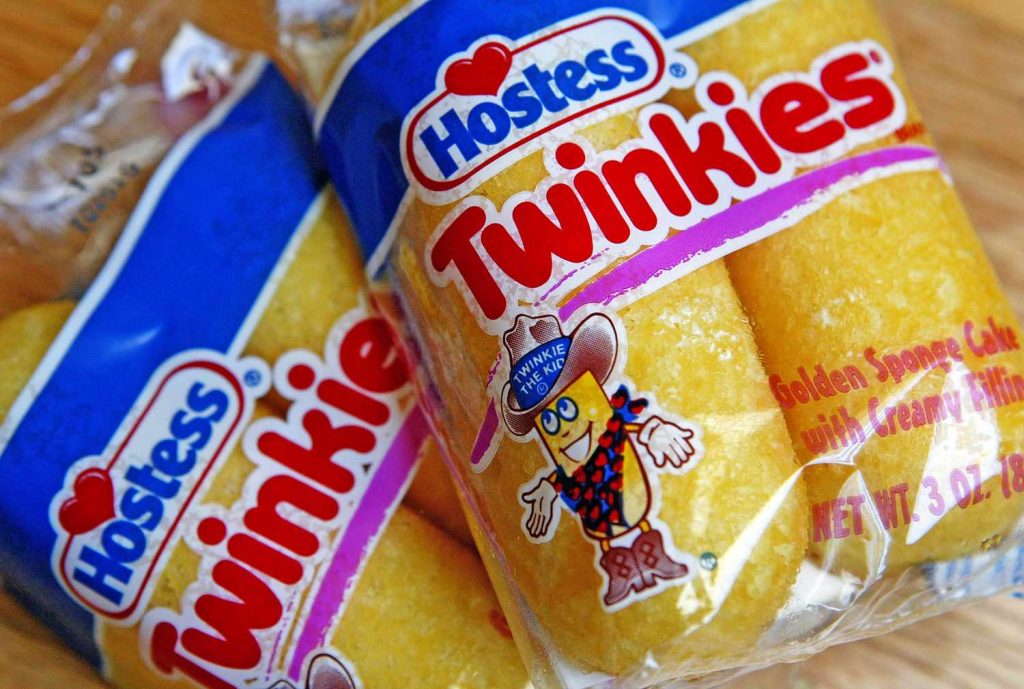
To listen to this reflection as a podcast, click here.
For 237 dark, desperate days, Americans lived in junk food limbo.
On November 21, 2012, Hostess – having filed for Chapter 11 bankruptcy protection – ceased production of all its iconic snack products. They finally returned to the shelves on July 15, 2013, after the brands had been purchased by another company.
People can get by for a while without Ho Hos, Ding Dongs, and Zingers. But not Twinkies. It’s hard to survive without the world’s most famous cream-filled sponge cake.
Time magazine, in fact, ranked the humble Twinkie #1 on its list of Top Ten iconic junk foods in 2012, observing that “they’ve been a staple in our popular culture and, above all, in our hearts.” This was true even though the Twinkie is “often criticized for its lack of any nutritional value whatsoever.”
A Canadian baker named James Alexander Dewar invented the Twinkie in 1930. The name came to him when he glanced at a billboard advertising Twinkle Toe Shoes. The original Twinkie filling was banana-flavored, but Hostess execs switched to vanilla during World War II when bananas ended up on the ration list.
Twinkies Cereal has now been around for a few years, and who can imagine a visit to a Midwestern state fair without at least contemplating a bite of a deep-fried Twinkie?
Chevrolet ran a funny Super Bowl ad about a decade ago showing a group of friends emerging from the rubble of the Apocalypse. The only two things that survived were Chevy trucks and a box of Twinkies. No, they don’t last 50 or 100 years, and they probably won’t make it through Armageddon. Official shelf life is currently reckoned to be 45 days.
Twinkies, in fact, would be more likely to shorten our lives. Right?
Hang on to that thought for a moment. An ongoing scientific study continues to produce evidence that junk food isn’t the make-or-break factor in human survival we once imagined.
What actually leads to a healthy and happy life? Researchers with the Harvard Study of Adult Development began tracking the lives of 268 Harvard sophomores in 1938. For 85 years, the project has zeroed in on their health habits, friendships, marriages, vocations, and personal choices. Most of the men in the original group (who included President John F. Kennedy and Benjamin Bradlee of the Washington Post) are no longer alive, but scientists have extended the research to their children and grandchildren.
What they have learned is that strong relationships are, by a longshot, the best predictors of enduring happiness.
“The surprising finding is that our relationships and how happy we are in our relationships has a powerful influence on our health,” says Robert Waldinger, the third overall director of the Harvard Study. He adds, “When we gathered together everything we knew about them at age 50, it wasn’t their middle-age cholesterol levels that predicted how they were going to grow old. It was how satisfied they were in their relationships. The people who were the most satisfied in their relationships at age 50 were the healthiest at age 80.”
He also points out, “And those good relationships, they don’t have to be smooth all the time. Some of our octogenarian couples could bicker with each other day in and day out, but as long as they felt that they could really count on the other when the going got tough, those arguments didn’t take a toll on their memories.”
Other studies have come to the same conclusion. Good relationships are actually a matter of life and death.
Sociologist Robert Putnam suggests that if you belong to no groups but decide to join one, “You cut your risk of dying over the next year in half.” According to the celebrated Alameda County Study, “isolated people were three times more likely to die than those with strong relational connections.”
The study revealed that people who struggled with smoking, obesity, junk food, and alcohol use – but who had strong social ties – lived significantly longer than people with more positive health habits but who were going through life alone.
Thus, in the words of author and pastor John Ortberg, “It is better to eat Twinkies with good friends than to eat broccoli alone.”
We have a long way to go, however.
The Gallup organization has described Americans as among the loneliest people on earth. A startlingly high percentage of our time is spent indoors, staring at electronic screens, with our blinds closed and our privacy carefully guarded.
Ortberg continues in his book Everybody’s Normal Til You Get to Know Them, “Of course, we all say that relationships are more important than money. But we constantly cheat relationships for the sake of work or money. There are no TV shows called Who Wants to Be a Great Friend? What we have come to call ‘reality’ shows are programs that deliberately pit one person against one. ‘Reality’ means having someone excluded or fired or voted off the show.”
Jesus was right. Human life comes down to loving God and loving others. To win all by ourselves is to lose.
Perhaps you’ll have the opportunity, on this Juneteenth holiday, to spend time with someone who isn’t usually on your appointment calendar. Give them the priceless gift of your attention.
And make their day by bringing along a pack of Twinkies.
As it turns out, they’re a surprisingly healthy way to cultivate a heart for others!
